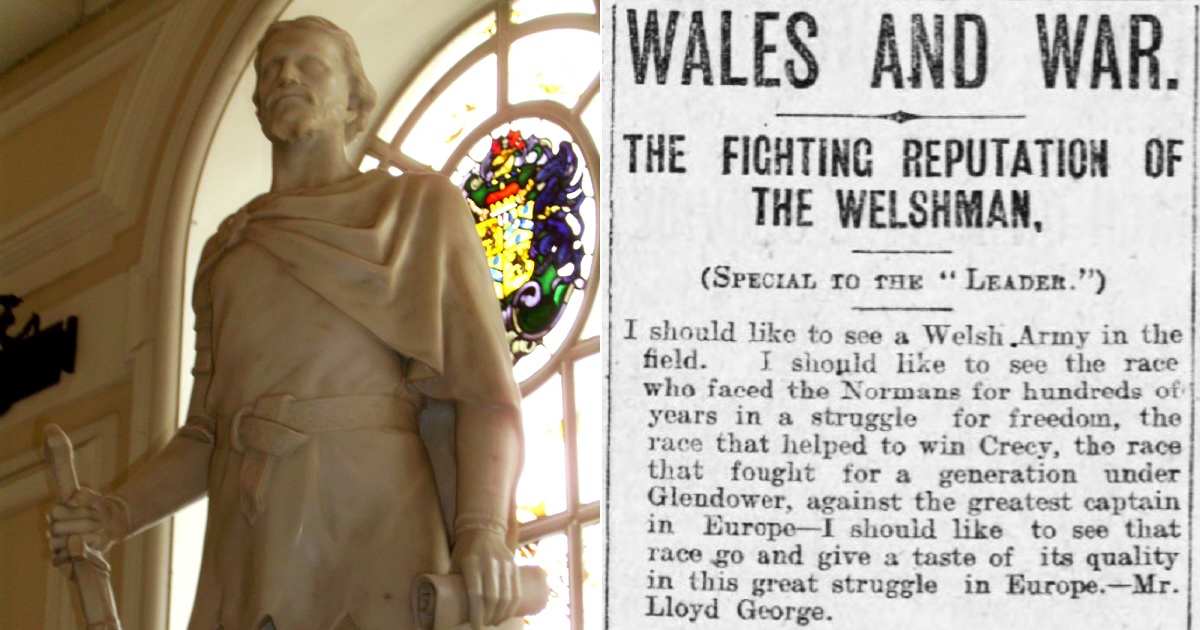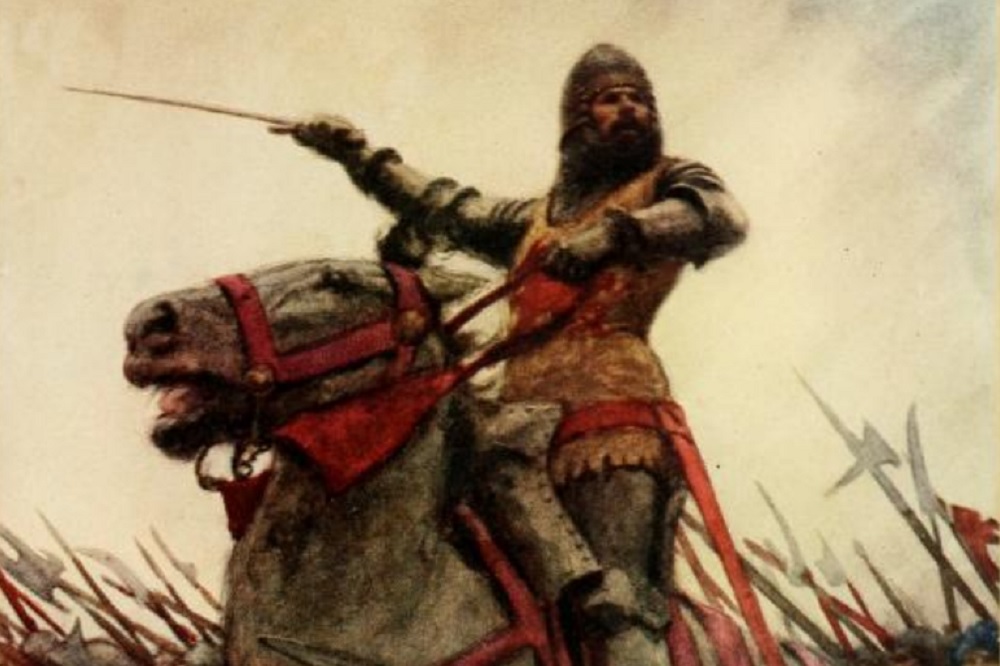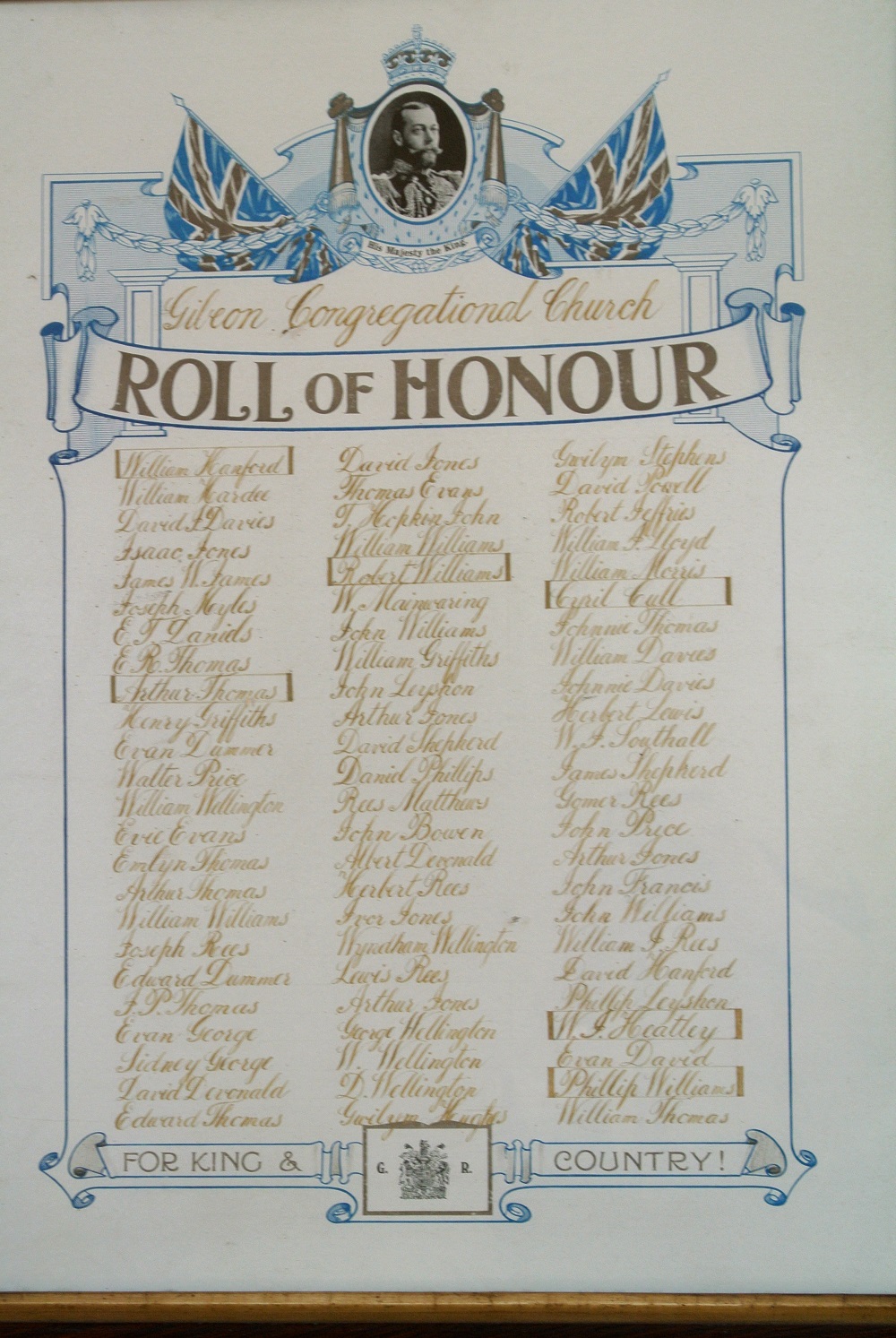How Owain Glyndŵr was used to recruit Welsh troops for the First World War trenches

Gethin Matthews, senior lecturer in History at Swansea University
It is one of the many paradoxes about the history of Wales and the First World War that Welsh heroes who fought against the forces of the English king were commandeered as recruiting agents for the British Army, centuries after their deaths.
The last Princes of the Gwynedd dynasty, Llywelyn ap Gruffudd and Dafydd ap Gruffudd were cited as notable examples of Welsh martial heroism even though both were killed by the forces of the English crown. However, the need to persuade young Welshmen to ‘join the colours’ was so great that it didn’t matter what historical inaccuracies were being spun.
Perhaps the Welsh hero whose memory was invoked most in this way was Owain Glyndŵr. The historical Glyndŵr had rebelled against the English crown in 1400, and declared himself Prince of Wales on 16 September that year. For many years his campaign was successful as the Welsh from all over the country – north, south, east and west – rallied to his cause.
However, the superior economic and manpower resources available to the English crown meant that by the end of the decade Glyndŵr’s reign had come to an end and he spent the rest of his years as a fugitive. Memory of his achievements faded away over the centuries until the late Victorian era, when a newly confident Wales (buoyed by the economic success that came from the exploitation of Welsh natural resources) re-discovered some of its ancient heroes.
When Britain found itself at war in August 1914, a state of affairs that no commentators had foreseen a month earlier, it caused a shock to the system and led to some contradictory developments. On the one hand, there was a great surge of British patriotism, as the people of the United Kingdom (and yes, that did include pretty much all of Ireland) rallied to the flag and proclaimed their loyalty to the King and his government in London.
On the other hand, there was a surge in both local and national patriotism within Wales. Each town and village wanted to prove itself more ‘loyal’ than its neighbour; the Welsh as a whole wanted to show that their contribution to the war effort was at least the equal of that of Ireland, Scotland, England and the other countries of the Empire.
As a result, a range of arguments were deployed to persuade young Welshmen to enlist.
‘Awake!’
One man embodied the response of the Welsh to the War, and that was Lloyd George. The speech he gave to an audience of London Welshmen on 19 September 1914 is noted in history books as one of the most powerful recruiting speeches of the entire war: in Wales its effect was electrifying. Amongst other brilliant rhetorical flourishes, Lloyd George referenced the heroism of Welsh soldiers in medieval times and directly referenced Glyndŵr in his struggle against the future Henry V: “I should like to see … the race that fought for a generation under Glendower against the greatest captain in Europe – I should like to see that race go and give a taste of its quality in this great struggle in Europe”.
Thus just as the Welsh fought for the rights of their small nation in Glyndŵr’s time, they were now urged to fight for justice for all small nations by joining the British Armed Forces.
At a recruiting meeting in Cricieth two days later, Lloyd George’s brother William George gave a speech which also stressed the role of Welsh medieval warriors, citing Glyndŵr as well as Llywelyn ap Gruffudd and Owain Gwynedd. The newspaper reports that his declaration “They were all men who died that the nation might live” was met with cheers by the audience. Other reports from around Wales note the loud applause as Glyndŵr’s name was invoked at recruiting meetings.
Newspaper editors and commentators amplified this use of Glyndŵr’s name to entice young men to volunteer. ‘SONS OF GLYNDWR AWAKE!’ was the banner headline for the editorial in the Llangollen Advertiser on 18 September 1914. Poets jumped on the bandwagon (the pages of Welsh newspapers in late 1914 are full of awful patriotic poetry) so we have two poems published in the Aberdare Leader on 26 September 1914 which cite Glyndŵr as they stress how the martial valour of the medieval Welsh is being revived. Thomas Williams’ poem ‘Y Rhyfel’ (The War) talks about Wales’ response and declares:
Gwladgarwch Glyndwr hoga fin ei chledd
(The patriotism of Glyndŵr sharpens [the country’s] sword)

‘I’r gad’
The appropriation of Glyndŵr’s memory to bolster the recruiting campaign continued in 1915 (along with the florid speeches and the bad poetry). The Welsh Department of the Board of Education urged schools to include presentations about Glyndŵr in their celebrations of St David’s Day, when they were also encouraged to remember former pupils who had fallen in the war. A piece about Glyndŵr and a painting of him were included in The Land of My Fathers, a publication (supported by Margaret Lloyd George, the politician’s wife) to raise money for Welsh troops.
Thus comparisons were implied between the modern Welsh soldier and his medieval forebears. A chaplain serving with the Welsh units training prior to deployment to Gallipoli compared his charges with the hosts of Llywelyn and Glyndŵr, “fighting to the death for freedom and justice, faith and peace”. In January 1916, O. M. Edwards, the editor of Cymru and one of Wales’ most influential commentators, declared “Y mae Owen Glyndwr yn y gad to” (Owain Glyndŵr is once more on the battlefield).
The most visible symbol of Owain Glyndŵr in the war years was the inclusion of his statue in the ‘pantheon of Welsh heroes’ in Cardiff City Hall. This was unveiled in October 1916 by Lloyd George, whose speech emphasised the contribution of great men from small nations to the history of the world. By this stage there was less need to call for volunteers as conscription had been introduced, but the poetry continued, including one example written by a serving soldier, Elias Williams of Porthmadog who was in the trenches of France serving with the Army Service Corps. The poem’s title, Ysbryd Rhyddid, translates as ‘The Spirit of Freedom’, and it contains the verse:
Clywasom ein Glyndwr / Yn llefain o’i fedd, / “Plant y mynyddoedd, / Diwaenwch y cledd.”
(We heard our Glyndŵr crying from his grave, “Children of the mountains, unsheathe the sword.”)
Thus the idea that the soldiers were fighting for the spirit of Glyndŵr was not just something that was spouted by the speakers at recruiting meetings, but also something that was believed by the soldiers themselves and could be worn by them as a badge of honour.

Small nations
However, if we fast forward to the end of the war, and the period of commemoration and raising monuments to those who served and died, it is much more difficult to find references to Glyndŵr and the other Welsh heroes of the medieval age. As the nation mourned the tens of thousands of lost sons, many of whom were killed by mechanized slaughter, it didn’t make sense to talk of romantic heroes from a chivalrous age.
All that talk of the rights of small nations also ebbed away. Thus after being appropriated for the duration of the war, Glyndŵr was discarded (not unlike the fate of tens of thousands of demobbed soldiers, who found that promises made during wartime were unlikely to be honoured). Instead, the war was commemorated in terms that put ‘King and Country’ in the centre of the frame, and that country was not the one that Glyndŵr had fought for.
One lesson that comes from this episode is that the use of history by those in power is not neutral, but it is fluid and can change with circumstances. Traditions can be made and unmade.
Past heroes such as Owain Glyndŵr can be conscripted, just as surely as young men.
Support our Nation today
For the price of a cup of coffee a month you can help us create an independent, not-for-profit, national news service for the people of Wales, by the people of Wales.






You can fool some of the people for all of the time and all the people for some the time, but you can’t fool all of the people for all of the time.
Wow, I did not know that.
It’s about time people respected the man by calling him by his proper name “Glyndŵr” and not “Glendower”.